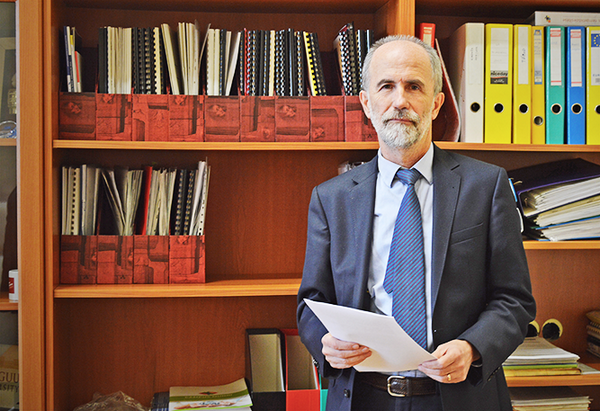Two keywords: Cooperation and innovation – are there any reserves?

I interviewed István Vilmos Kovács, Director of International Relations and Innovation of our university about his professional background and his plans for the coming period, with special regard to the support to scholarly achievements.
István Vilmos Kovács defines himself as an actor who connects educational practice with scientific achievements,
and therefore his aim is to help shape the research environment accordingly. During his career he has gained experience in roles that underpin his current activities. He had started out as Physics teacher at a secondary school, subsequently he was in charge of International Affairs and the planning of EU programmes at the Ministry of Education. He took part primarily in research targeted at education. His work included the analysis of policies in an international context. Besides education, he was also responsible for sectoral development during the years in which he worked for the National Development Agency. He has recently worked in one of the research teams of ELTE (Eötvös Loránd University) that focused on innovation in education and on knowledge management. He was able to do all this besides his teaching activities that encompassed several topics concerning the management of higher education.
Scientific results can often be successfully applied to improve educational practices.
As an example, István Vilmos Kovács mentioned the role of brain research in understanding the learning process and in developing education, thus providing direct support for the research and development experts dealing with the learning environment. In order to strengthen their motivation and personal experience, students can be involved in the planning of studies, in the organization of learning, in the collection and utilization of feedback for the purposes of development. It is essential for students to experience learning as an „investigative activity”, that is to understand the learning process itself as a research assignment. If students work on real-life problems, research-based learning can contribute to future solutions.
Are there any reserves in terms of strengthening the synergies between the various functions of the university?
The ambition of István Vilmos Kovács is to advocate a closer connection between teaching and research content-wise and to link the latter to the problems of the environment surrounding the university through the strengthening of the international dimension and the innovational approach. As a result, the time and performance pressure on the lecturers could be more manageable, furthermore scientific results would not only improve as far as academic indicators are concerned, but also in such a way that they could benefit society.
In your view, one of the concrete challenges to be addressed is that administrative staff should not function as an isolated subsystem.
A new approach is needed in how lecturers perceive administrative staff and how in turn administrative staff perceives lecturers and researchers. On the one hand, lecturers should not distance themselves from administrative tasks which they should not regard as „never tested, unpleasant obstacles”, they should even make suggestions as to how the procedures could be improved. On the other hand, staff employed in the central organizational units should be aware of the substantive consequences of their work, that is, how the way they address tasks centrally will impact on the effectiveness of teaching and research. One example: knowledge acquired in the course of foreign trips and international projects could be shared more widely and meaningfully than is done currently. The related work that requires the commitment of both the central coordination and faculty units, is a good investment.
The university is elaborating its international strategy
under István Vilmos Kovács’s coordination. The document is due in January 2018. From its comprehensive themes, the director has stressed three elements that represent bottlenecks to development. First, the current strategic documents of the institution have already set the goal of the university becoming gradually bilingual. This compelling task requires considerable efforts even in the short run. Second, it would also be worth to exploit the substance of international work better. It happens that besides the massive organizational tasks related to mobility there is no time and energy to identify the valuable knowledge that is close at hand as a benefit of internationalization. Providing access to this knowledge for each other would be a step forward. Third, involving students as much as possible in assisting with research and lecturing tasks as well with the organization of international activities could also be a strategic objective. Work done at the university, for the university by students offers them an excellent training field for applying what they have learnt.
To sum it up: István Vilmos Kovács wishes to contribute to our university’s mission by having the social benefits of scientific results reinforced, by having the synergies between teaching and research activities exploited (with the involvement of students), and by having the innovational approach strengthened in performing teaching, research and organizational tasks.
Miklós Kozma
Department of Business Studies
